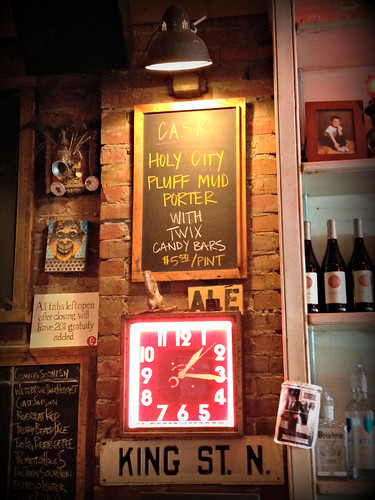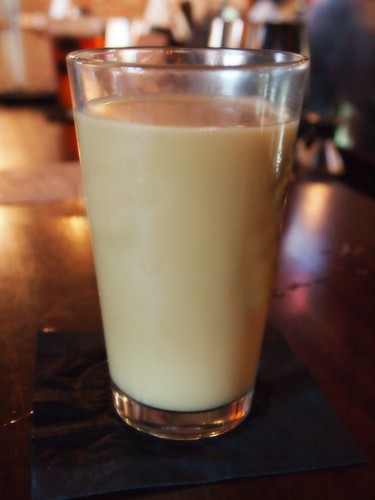 The Session is a monthly event for the beer blogging community, begun in March of 2007 by Stan Hieronymus of Appellation Beer and Jay Brooks of the Brookston Beer Bulletin.
The Session is a monthly event for the beer blogging community, begun in March of 2007 by Stan Hieronymus of Appellation Beer and Jay Brooks of the Brookston Beer Bulletin.
On the first Friday of every month, a pre-determined beer blogger hosts The Session: Beer Blogging Friday. He or she chooses a specific, beer-related topic, invites all bloggers to write on it, and posts a roundup of all the responses received. For more information, view the archive page.
Alan McLeod —at the blog A Good Beer Blog— became the emergency host of the 95th iteration of The Session, when the original host went missing-in-action.
For January 2015, his topic is "What beer book which has yet to be written would you like to see published?"
I co-authored three books which were published in 2014 and now know what a mug's game it is. In fact, there was very positive talk of another at a more advanced level. But it was not a piece of work that was within the reach of the budget if a proper job was to be done. Travel and hotel costs to allow for research. Time away from work. We wanted to do the complete thing. No rush around the world or the internets for a skipping stone study would do. So it wasn't done. It may yet be but at this point it's on the back burner. Now that I know this I realize that resources may well stand between many a good author and many many more good readers. Does good beer suffer overall because of it? I have no doubt that it does.
So... on January 2, 2015, let the fates know that you know of their cruelty. What is the book you would want to write about good beer? What book would you want to read? Is there a dream team of authors you would want to see gathered to make that "World Encyclopedia of Beer and Brewing"? Or is there one person you would like to see on a life long generous pension to assure that the volumes flow from his or her pen?
***************
Jason Oliver is the heavily-medalled brewmaster for Devils Backbone, a brewery and brewpub in central Virginia, which, although flagshipped with a Vienna lager, is multi-modal, known for ales and lagers. A decade earlier, Mr. Oliver had been the executive brewer for the mid-Atlantic group of Gordon-Biersch brewpubs, a chain heavily Teutonic, where lagers predominate.
Thus, I give great credit to Mr. Oliver, who, when he was still with Gordon-Biersch, uttered this pearl of wisdom, not about lagers, but about ales. Cask ales. To an assemblage gathered at a beer tasting at RFD, a good beer pub in downtown Washington, D.C.
You put beer in a cask: that's beer in a cask. Anyone can do that. You condition ale in a cask: that's cask-conditioned ale. There's a big difference.
That is an understanding so simple, yet so profound. So why is it, a decade later, one sees and tastes so many cask ales whose construction shows only ignorance or churlish whimsy?
Cask-conditioned ale is fresh beer, tasting as beer straight from a fermenter: bursting with flavor not dulled by time, temperature, or travel. But such a pure ale-as-art has become harder to find in America. Indeed, it is easier to find beers tossed in casks by brewers with no consideration of appropriateness or skill, than it is to find beer whose freshness is sine qua non. No, to these brewers, a cask is merely a thing in which to toss a beer for sport, a pot in which to toss extraneous, irrelevant ingredients. And, unfortunately, more and more drinkers are coming to think the same, as well.
Exhibit one. This apostasy actually masqueraded as a 'craft' cask-conditioned ale.
Twix bars? That is what they're putting in a cask and calling it 'craft'? Did those brewers even know what was in a Twix bar?
Milk Chocolate (Sugar, Cocoa Butter, Milk Ingredients, Cocoa Mass, Lactose, Soy Lecithin, Polyglycerol Polyricinoleate, Artificial Flavor), Enriched Flour (Flour, Niacin, Reduced Iron, Thiamine Mononitrate, Riboflavin, Folic Acid), Sugar, Hydrolyzed Palm and Palm Kernel Oil, Corn Syrup, Milk Ingredients, Dextrose, Salt, Cocoa Mass, Sodium Bicarbonate, Soy Lecithin, Soybean Oil, Artificial Flavor.
Cask-conditioned ale is not a sponge from which to squeeze out Twix, or thiamine mononitrate, or cocoa-puffs and dingleberries*, or whatever else might catch a brewer's fancy, with no forethought except for, "hey, what the fuck?"
And mind this. Not all beers taste better at the lower carbonation level or warmer temperature of good cask-conditioned ale. A cask saison? Why? Give me a bottle or draft.
Cask-conditioned ale is a skill; it's an art; it's the beauty of a beer at its freshest. It's unfiltered beer, brewed from traditional ingredients, that has undergone a final fermentation WITHIN a cask, and then served from that cask, at cellar temperature (52-54 °F, or so), without extraneous gas pressure, either pumped from the cask by hand, or by simply opening a tap which has been hammered into a bung. Think of a cask as a fermenter (albeit a small one) containing active, still fermenting, beer.
Exhibit two. Don't get me started on those (oh, too many) pubs that toss a cask on the bar, tap it with a —WOW— huge explosion of beer, and think that the resulting sludgy, now de-carbonated mess, is good beer.
Recently, after I had explained the cask-conditioning process to a newbie publican, he replied, "Why, that's easy." Why, yes, I agreed, it is simple, a truism that makes the presentation of so much bad beer, served in the name of cask-conditioned ale, all the more perplexing and distressing. Why can't others have this easy perspicacity?
Cask-conditioning is a continuum from brewer to cellarman to deliveryman to publican. Be lazy at any part of that chain, and the ale is not cask-CONDITIONED. It's crap.
This rant concerns 'craft' cask in America. The British, from whom we learned it, 'do' cask-conditioned well. And, yes, there are many conscientious brewers and publicans in the United States who have learned their lessons well, who understand the process. But, for the most part, cask-conditioned ale in America has jumped the Twix bar. It's become a bad joke.
Thus, it's due time. It's past time. We need a book, a primer, on cask-conditioned ale. Ask for it; plead for it; hope for it. So that our brewers can learn what an amazing thing cask-conditioned ale is and how to make it, and that our drinkers will understand what it is, and thus come to demand the same of their brewers.
Please.
-----more-----
- Alan McLeod has posted a roundup of the twenty-three (including his) responses, including a snyposis of each: here.
- CAMRA —the Campaign for Real Ale, a cask ale advocacy group in Great Britain— publishes a how-to book called Cellarmanship. Although universally useful, it still is a book geared more to the practice and conditions in the U.K.
- * I cannot claim credit for the term "Cocoa-Puffs and dingleberries." That bon mot belongs to one Joseph Marunowski, past brewer at Sam Adams and brewmaster at Heavy Seas, to name a few.










I've written a pamphlet 😀
ReplyDelete